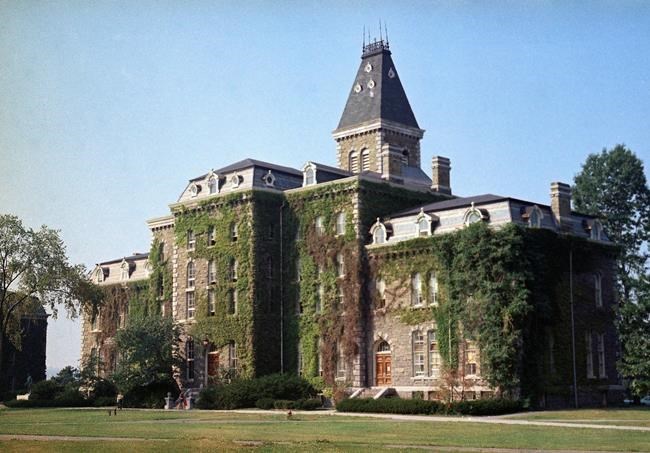
FILE- In this Aug. 28, 1973, file photo, McGraw Hall stands on the campus of Cornell University in Ithaca, N.Y. As colleges around the country grapple with how to reopen in the fall, on Tuesday, June 30, 2020, Cornell's president announced that it will welcome students back to campus, an option she said is best not only for their education, but also public health. (AP Photo/Jonathan Jay Fink)
Republished June 30, 2020 - 4:04 PM
Original Publication Date June 30, 2020 - 1:21 PM
As colleges around the country grapple with how to reopen in the fall, Cornell University's president on Tuesday announced that it will welcome students back to campus — an option she said is best not only for their education, but also public health.
The Ivy League university decided that compared with holding classes only online, residential learning would be safer for students and the wider community because it can ask students to participate in a screening program to detect and contain any spread of the coronavirus, President Martha Pollack said.
“The key consideration in our decision to reopen is public health,” Pollack said in a statement.
In contrast, many other universities around the country, citing concerns for the health of students and faculty, have developed plans to bring smaller numbers of students to campus or emphasize online instruction. Dozens of others have announced plans to reopen with modifications to campus life.
Modeling by a Cornell research team determined that two to 10 times more people could be infected with COVID-19 during an online-only semester, with significantly higher numbers becoming seriously ill. That’s because many students planned to return to off-campus housing in Ithaca, New York, where the university is located, and it would have no authority to mandate testing or restrict student behaviour if instruction was done remotely.
Some campuses already are seeing flareups of the virus among students living off-campus. Officials at the University of Washington said at least 38 students living in 10 fraternity houses had tested positive as of Tuesday. House residents are being asked to self-quarantine and a testing site was opened nearby.
Officials said the frat house cluster offers a lesson to students preparing to return to campus this fall. “If everyone does their part to keep each other safe, we can continue to engage with one another and with our studies in the University environment by wearing face coverings and remaining physically distant,” Dr. Geoffrey Gottlieb, chair of the UW Advisory Committee on Communicable Diseases, said in a statement.
It follows a cluster of cases reported earlier this month among fraternity members at the University of Mississippi.
Ithaca Mayor Svante Myrick said most people in town will be relieved because it would be “catastrophic” for the economy if students did not return.
“Yes, bringing people back into town might increase the spread of the virus,” Myrick said. “But Cornell’s methodology, the reasoning it took to make this decision was very sound. The testing regimen they’re proposing is very, very robust.”
As planned, Cornell students will be subject to agreements to follow public health guidelines and comply with a testing program. Testing will start before or upon students’ arrival in Ithaca, followed by frequent screening and a daily online health questionnaire. Masks and social distancing will be required in classrooms, large gatherings will be restricted and dining will be takeout or by online reservation at distanced tables.
Fall classes start Sept. 2 as a blend of in-person and online instruction and most students will return home before Thanksgiving and finish the term with online instruction and exams in December. Remote learning options will be available for students unable to return to Ithaca.
Most of the 24,000 students at Cornell left Ithaca in March when the coronavirus pandemic struck, leaving the small college town’s businesses reeling. Cornell students spend an estimated $225 million annually, fueling a thriving local economy.
Myrick said Tompkins County, where Ithaca is, has robust virus testing, contact tracing and social distancing compliance. There have been 167 confirmed COVID-19 cases and no deaths in the county.
Guidelines issued by the Centers for Disease Control and Prevention say colleges should work with state and local officials to decide how to reopen and should follow safety measures such as smaller classes in larger rooms.
The CDC is not recommending entry testing for all returning students, faculty, and staff, according to guidance issued Tuesday. Agency officials said that kind of testing has not been systematically studied, and it’s not clear if it would reduce the spread of the coronavirus. CDC is recommending testing for anyone with coronavirus-like symptoms, and for anyone recently exposed to someone who tested positive.
___
Follow AP coverage of the pandemic at https://apnews.com/VirusOutbreak and https://apnews.com/UnderstandingtheOutbreak.
News from © The Associated Press, 2020